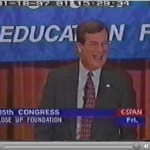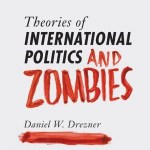education
Remember when I said more bio grad students should play with coding and modeling? Here's an example of what I mean. Laurence Frabotta directed me to this animation by phylogeneticist/bioinformatics programmer Liam Revell, an assistant professor at U Mass Boston, who used the statistical package 'R' to write a short code generating all possible bifurcating and multifurcating phylogenetic trees for a set of taxa. Apparently there are 2,752 for seven taxa (I have to take his word for it, my basic math skills have long since escaped me) and this animation runs through all of them. It's not…
It's college admissions season, which means a steady influx of high-school seniors thinking about coming here next year, making campus visits. Most of these students sit in on at least one class, to get an idea of what it's like. Which occasionally leads to odd things, but nothing stranger than what just happened: a prospective student just sat in on my junior/senior level elective class on quantum mechanics in the state-vector formalism. I suspect he didn't get a whole lot out of today's lecture, on changing state vectors and operators from one basis to another. In fact, I suspect this might…
"Man"
The Tennessee General Assembly overwhelming passed Bill 368 yesterday (April 7), stating:
Teachers, Principals and School Personnel - As introduced, protects a teacher from discipline for teaching scientific subjects in an objective manner.
At first blush, it sounds reasonable. Is it?
From ScienceInsider:
In addition to AAAS {American Association for the Advancement of Science}, the Tennessee Science Teachers Association, the American Civil Liberties Union of Tennessee, and the National Center for Science Education (NCSE) have expressed their opposition to the bill.
"There has…
A few weeks ago, I gave a talk based on How to Teach Physics to Your Dog for the University of Toledo's Saturday Morning Science program. At that time, their local PBS affiliate recorded the talk, for use on their very nice streaming video site, Knowledgestream.org. My talk is now up, and the video is hopefully embedded below:
I haven't listened to the entire thing, but I watched the first 10-15 minutes, and it's pretty good. the sound is coming from a microphone on my shirt, so you can't really hear any of the audience reaction (I got some good laughs in appropriate places), and in places…
The science portion of The Nation's Report Card was released on February 24th, with test scores from school districts in seventeen urban centers. Almost every district performed below the national average. Greg Laden explains, "Poverty determines the outcome of the results, and this is probably exacerbated in urban zones where private schools siphon off the small number of higher-income kids." Although Department of Education officials were firm in their stance that "correlation does not equal causality," Greg plots test scores against poverty level in the cities surveyed and reveals a very…
Wow - my post about unhappy bio grad students is getting massive traffic. (Hi SlashDotters and StumbleUpon-ers!) Mike the Mad Biologist, my original inspiration, has responded here and here to all the buzz.
I pretty much said everything I wanted to say in the original post, and I don't pretend to have an explanation or cure for this problem. But I see that there's been some snarkiness on the intertubez (shocking!!!) while I was away watching the developments in the Myriad appeal. So I want to clarify two points.
First, let me emphasize that I'm not saying graduate students in other fields don…
...Or not?
Not surprisingly, one of my professional interests is the use of Twitter and other social networks/media in higher education. And not just for educational/classroom purposes but also for outreach.
In other words, people who work at a college or university using Twitter in an official capacity to reach out to other people outside their organization. Of course, this applies to using Twitter to recruit students, to reach out to parents, to connect to similar external departments or organizations.
It also applies to outreach within an organization. For example, we use twitter at my…
The oral arguments in Monday's Myriad appeal are online here. (Scroll down and look for Association for Molecular [Pathology] v. PTO).
Can You Understand Our World Without Mathematics?
I could grapple with this question, but I'll let physicist Richard Feynman of the Manhattan Project and Nobel Prize winner in Physics, take it on.
This video {watch it here} was graciously shared by Sir Harold Kroto, excerpted from the BBC when he did a presentation for them {credit: BBC Horizon and producer Chris Sykes.}
I encourage you to watch this brief video. I find Dr. Feynman's perspective particularly refreshing after viewing a polar opposite, dismissive view of science and mathematics from former U.S. Senate Majority Leader Trent…
Thursday's post about the troubles of biomedical scientists drew a response from Mad Mike saying that, no, biomedical science Ph.D.'s really don't have any career options outside of academia, and pointing to Jessica Palmer's post on the same subject for corroboration. Jessica writes:
This is something I've tried to explain many times to nonscientists: most of the esoteric techniques I mastered during my thesis aren't useful outside a Drosophila lab. They're not transferable to any other field of biology, let alone any other scientific or nonscientific profession. Those skills I picked up on…
Source.
What is the academic value of Jersey Shore's Snooki? I'll let my readers decide. But consider this.
According to NJ.com, Rutgers University paid $32,000 for this reality TV performer for a question and answer session with students. Academic value? Questionable indeed.
In contrast, Nobel Prize winner in Literature Toni Morrison will be receiving $30,000 for a Commencement speech at the same institution.
What are the implications for the relative value of entertainment and bone fide education in our society?
This is not an April fool's joke.
Within certain education and policy circles the acronym STEM (i.e., science, technology, engineering, math) has become a common term, used frequently to be inclusive when referring to a broad area of scholarship and enterprise we deem particularly connected, i.e., those listed four subjects. How, or even whether the acronym is understood and fashionable outside these education "insider" groups is not well know. What is known, though, is that the acronym and associated term is not well defined even within groups that make heavy use of it.
When we say STEM, do we simply mean any of the four…
Is studying science and mathematics valuable for a general education? Former U.S. Senate Majority Leader Trent Lott said it is a "waste of my time, waste of my teacher's time and a waste of space" - if your goal is to become a lawyer. His audience roared in laughter and applause. Is such an attitude entrenched in our society?
This brief video, shared by Sir Harold Kroto from his seminar at the American Chemical Society meeting this week, "Science, Anti-Science and Survival" exemplifies this caustic attitude towards education in science, technology, engineering and mathematics (STEM) that…
I've got draft versions of all the chapters of the book-in-progress now, which is great. Of course, when you add up all the words in those chapters, it comes to 92,000, when the contract calls for 70,000. Which means I've entered the part of the writing process where progress is measured not by how many new words I type, but how many old ones I can make disappear.
I always find this faintly depressing, but it's a nearly inevitable part of serious writing for me. There have been a few cases where I've had open-ended writing assignments-- one of the papers I published in grad school, and my Ph.…
It's the very last installment of Zombiefest - one more book review, this time for one I heartily recommend!
Daniel Drezner, a professor of international politics at Tufts, prefaces his new book about zombies with an unexpected vignette - a visit to Graceland:
By the time my tour hit the Jungle Room, it was obvious that the thirty-odd people walking through Elvis Presley's mansion fell into two groups. The first contingent was thoroughly, utterly sincere in their devotion to all things Elvis. They were hardcore fans, and Graceland was their Mecca, their Jerusalem, and their Rome. . . the…
This series of four posts by William M. Briggs is pretty interesting stuff.
The kind of thing where I'm torn: is it the most brilliant and perceptive thing I've ever read about higher education or is it a series of slightly early April 1st posts?
Dear Internet, I really need all you people out there to help me figure this one out. Which way does it go.
And by the way, you really have to read all four posts to get the complete message. The comment streams are interesting too.
University Professors Teach Too Much: Part I
Here is what everybody knows: the best researchers are often not the…
I've written before about the effect poverty has on educational performance. From the City of Brotherly Love, Philadelphia, PA, we read this heartbreaking account of the violence many poor kids face in the classroom:
A yearlong Inquirer investigation found that young children - from kindergartners to 10-year-olds - have been assaulting and threatening classmates and staff members with increasing ferocity and sophistication.
A number of the attacks had sexual elements - there were 187 morals offenses during the last five years in schools with grades no higher than fifth, and 1,118 in all…
The myriad miseries of graduate school are reserved to no one discipline, but there may be something to the contention that biology graduate programs are particularly bad. Here's what Mike the Mad Biologist says, in response to Science Professor, and I think he's quite right:
The basic problem stems (so to speak) from too many biology Ph.D.s and not enough funding, leading to an immensely cutthroat environment--and one that is psychologically damaging to boot. . . .So why does this dysfunctional cultural paradigm exist? I think it has to do with two things: specialization and Ph.D. training…
If you hate math, or know someone who hates math, Sir Harold Kroto describes an elegantly simple way to understand algebra - using shapes.
I had the pleasure and honor to meet Sir Harold Kroto yesterday at the National American Chemical Society meeting. He spoke on "Science, Anti-Science and Survival." The session topic was "Scientific Freedom and Human Rights in Chemistry and Related Sciences," in which I am deeply engaged {my seminar followed his, a very tough act to follow - but that may be a topic for another day.}
During lunch, Harry shared with me an important project that he has led…
I got my student comments from last term's intro mechanics course yesterday, which is always a stressful moment. As tends to happen, they were all over the map, with some students really liking me and others absolutely hating me.
It struck me while I was reading through the written comments that the experience is a lot like reading Amazon reviews of my book. I think there's actually a decent analogy between the response of authors to reviews and the response of faculty to student evaluations:
-- Really good comments can make you feel great, but the negative ones make you feel worse. I've got…





